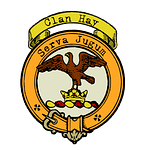Welcome back to A Clan A Day Podcast, brought to you by bagtownclans.com. I’m your host, Colin MacDonald, and today, we’re exploring the proud yet somewhat enigmatic story of Clan Pollock, a distinguished armigerous clan with roots deeply planted in Scotland’s medieval past. From the shadowy Norman origins to notable historical figures and its connections to influential clans, Clan Pollock’s legacy is a tale of loyalty, resilience, and transformation.
The story begins in the 12th century with Fulbert, a knight of Norman descent who hailed from Oswestry, Shropshire. Fulbert came to Scotland in 1136 as a vassal of Walter fitz Alan, the 1st High Steward of Scotland. Walter fitz Alan played a pivotal role in the early Scottish royal household, serving under King David I. Fulbert, in turn, earned his place among Scotland’s early nobility through his service, fighting for King David at the Battle of the Standard in 1138, a key conflict in which Scottish forces clashed with the English near Northallerton.
In recognition of Fulbert’s loyalty and martial prowess, his sons were granted lands along the southern bank of the River Clyde in Renfrewshire. This grant was confirmed by a charter from King Malcolm IV in 1157, and the family name, Pollock (or Pollok), soon emerged, derived from these lands. The name would become emblematic of the region, preserved in places such as Pollokshields and Pollokshaws, linking the family indelibly to Scotland’s cultural geography.
Fulbert’s eldest son, Petrus de Polloc, was the first to officially use Pollock as a surname. In 1163, Petrus made a notable contribution to the Church, granting the local church of Pollock to the monks of the Priory of Paisley. This act underlined the Pollocks’ dedication not just to feudal service but to spiritual and cultural development. Petrus also gave the barony of Rothes as a dowry for one of his daughters, intertwining the Pollock legacy with other noble families. His brother Robertus continued this pattern of ecclesiastical patronage by granting the church of Mearns to Paisley’s monastic community between 1189 and 1199.
The Pollocks’ trajectory, however, was not without strife. By the late 13th century, the political landscape of Scotland was marked by turbulence. John de Polloc’s signature on the 1296 Ragman Rolls, pledging allegiance to King Edward I of England, is a telling reminder of the clan's entanglement in the complex loyalties of the Wars of Scottish Independence. Yet, allegiance shifted as history dictated: in 1568, John Pollok of Pollok fought for Mary, Queen of Scots at the Battle of Langside, located just a stone’s throw from Pollok Castle. The defeat saw John forfeiting parts of his estate, a stark reminder of the heavy costs loyalty could exact.
The clan’s resilience shone through the 17th century when Sir Robert Pollock was knighted and made 1st Baronet of Pollok in 1703 by Queen Anne. This elevation came as recognition for his unwavering service to the crown and solidified the Pollocks’ status in Scotland’s aristocracy. The family's legacy extended beyond Scotland, as many members became prominent in the broader British Empire. Sir Jonathan Frederick Pollock served as Lord Chief Baron of the Exchequer, while Field Marshal Sir George Pollock rose to prominence in military ranks.
Perhaps even more intriguing is the Pollocks’ genetic and diaspora history. By the 18th century, several members of the Pollock family emigrated, changing the spelling of their name to Polk or Pogue. Capt. Robert Bruce Pollok, who left Donegal for Maryland around 1680, is a notable ancestor of some influential American figures. Among these descendants were James K. Polk, the 11th President of the United States, and General Leonidas Polk, known for his role in the American Civil War.
The Pollock name continued to resonate in leadership, evidenced by governors like Charles Polk of Delaware and Trusten Polk of Missouri. Oliver Pollock, another notable figure, settled in Pennsylvania and earned the moniker “financier of the American Revolution in the West,” demonstrating the clan’s reach into both the economic and political fabric of early America.
Despite their notable contributions, the Pollocks' presence in Scotland waned after the 19th century. The last recognized Pollock chief passed away in 1845, leaving the clan armigerous—without a chief. Pollock Castle, which had stood as a symbol of the family’s prestige, was dismantled in 1954. Today, the remnants of the once-magnificent estate include gatehouses, stables, and a gardener’s cottage, which continue to echo with the legacy of the Pollocks.
Clan Pollock’s enduring motto, Audacter et Strenue—"Boldly and Earnestly"—aptly encapsulates their spirit. Though the physical stronghold of their power has faded, the legacy of the Pollocks persists, rooted in their contributions to Scotland, and immortalized through notable descendants and continued recognition as a sept of Clan Maxwell.
Thank you for joining us on today’s journey through the legacy of Clan Pollock. Be sure to tune in tomorrow for another chapter in Scottish clan history on A Clan A Day Podcast. I’m Colin MacDonald, and as always, Go n-éirí an bóthar leat.











